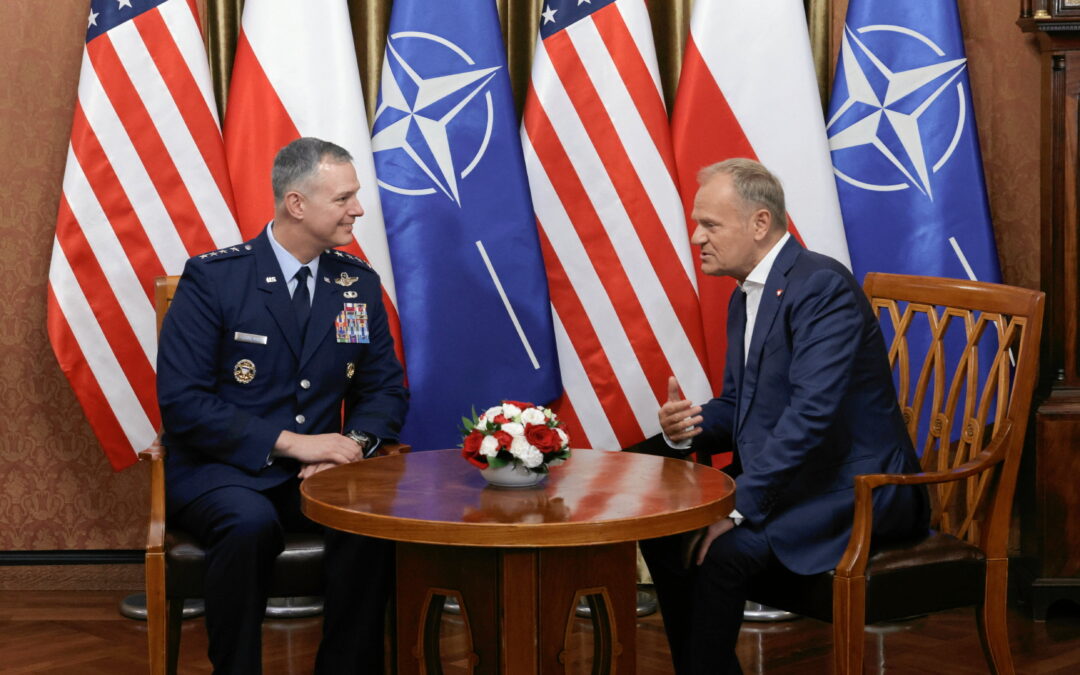Keep our news free from ads and paywalls by making a donation to support our work!

Notes from Poland is run by a small editorial team and is published by an independent, non-profit foundation that is funded through donations from our readers. We cannot do what we do without your support.
Poland’s Prime Minister Donald Tusk has said that NATO’s Europe commander, General Alexus Grynkewich, confirmed to him during a meeting on Friday that “Russia will be ready to confront Europe, and therefore us, as early as 2027”.
“There is no reason for us to scare each other, but we must be truly vigilant and focused,” stated Tusk in a video posted on X, warning that “Poland must be ready”.
Tusk’s warning comes after a similar comment he made last week. While announcing a long-awaited government reshuffle, the prime minister cited American reports pointing to “a direct threat from Russia [that] could materialise as early as 2027”.
Wojna i pokój. pic.twitter.com/HMZAMbE4ax
— Donald Tusk (@donaldtusk) July 25, 2025
“Poland and Europe, but primarily Poland, must be prepared for various events over the next two years,” Tusk said in a meeting during the weekend with citizens of the Polish town of Pabianice.
Tusk explained that he has received information that, based on assessments by NATO and the US, “Russia and China will be ready for global confrontation as early as 2027”. He went on to clarify that the Americans are preparing “not for a war” itself, but for “a situation in which our global opponents will be ready” to launch a war.
Tusk also spoke of the importance of unity in Europe in the face of “a possible showdown between the West and the East”. He added that it is crucial for Russia that Europe is divided and that “Poland and other countries bordering Russia are also divided and isolated from the rest of the West”.
🎥‼️"Nasze wiadomości wywiadowcze mówią o takim scenariuszu zagrożenia wojennego w 2027 roku" @CTomczyk ‼️⬇️@RadioZET_NEWS @BeataLubecka #GośćRadiaZET pic.twitter.com/UGNx6ehYPe
— Gość Radia ZET (@Gosc_RadiaZET) July 25, 2025
Meanwhile, deputy defence minister Cezary Tomczyk, asked last week by Radio ZET about Tusk’s comment during the reshuffle, stated that “our intelligence reports indicate exactly the same possible scenario”.
Tomczyk explained that both NATO generals and the Polish defence ministry are talking publicly about that threat “in order to let China and Russia know that we are aware of these scenarios, so that they do not come true”.
He also confirmed that Poland plans to allocate about 5% of its GDP for defence in next year’s budget. “This is a quarter of the total state expenditure,” Tomczyk added.
The deputy defence minister said that while military alliances are key for Poland, the country is above all focusing on “the modernisation and transformation of the Polish army, because in order to count on…our allies, we have to be strong ourselves”.
He explained that the Polish army has since January been developing its drone use strategy. The defence ministry also plans to issue in the coming months a “wartime handbook” for each Polish household.
Poland says that it has been facing unprecedented attempts by Russia to interfere in its internal politics as well as physical incidents that include a series of arson attacks. It is also dealing with a long-running migration crisis on its eastern border, engineered by Belarus
Poland is already NATO’s largest relative spender and, with 210,000 troops, has the alliance’s third largest land army, behind only the United States and Turkey.

Notes from Poland is run by a small editorial team and published by an independent, non-profit foundation that is funded through donations from our readers. We cannot do what we do without your support.
Main image credit: Dawid Żuchowicz / Agencja Wyborcza.pl

Agata Pyka is a former assistant editor at Notes from Poland. She specialises in Central and Eastern European affairs, cybersecurity, and investigative reporting. She holds a master’s degree in political communication from the University of Amsterdam, and her work has appeared in Euractiv, the Balkan Investigative Reporting Network (BIRN), and The European Correspondent, among others.



















